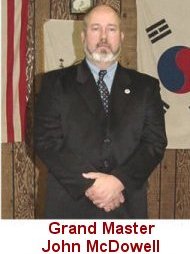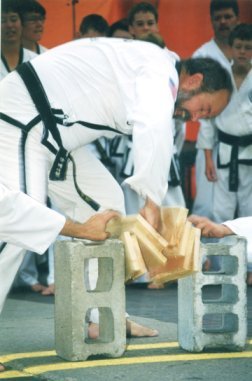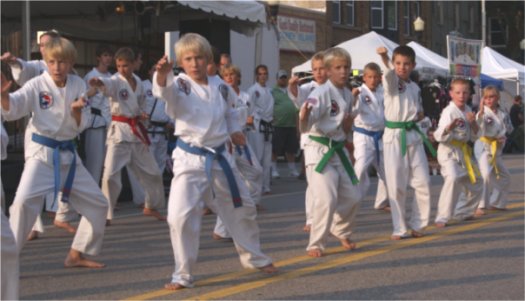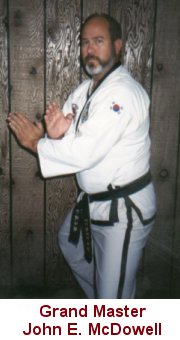Being inconsiderate is bad enough, but an ever increasing number of young
people seem to be receiving gratification from deliberately causing
others to suffer pain and indignity. These behaviors range from verbal
abuse and theft of personal property to outright physical abuse. As
common as such incidents have become in school, one should be able to
safely assume that they occur with even greater frequency when these
young people are left unsupervised, to their own devices. Although
instances of this nature are all too common, I am not yet convinced
that deriving pleasure from causing others to suffer is an integral
part of our "Human Nature". It will therefore be my intention in this
article to offer an hypothesis for this degenerative behavior pattern
and relate how traditional martial arts training could ultimately prove
to be a remedy for this malady.
 The shift in prevailing attitude from an emphasis on "God and Country" to
one of "find yourself" and "if it feels good, do it", which gained
momentum in the early 1960's, seems to have provided us with a whole
generation of adults with a desire for immediate gratification. The
problem became compounded in the late 1960's and early 1970's when these
members of the "ME" generation began pairing off and producing families.
A person who cannot or simply chooses not to put others before self
will not, in my opinion, make a very good parent. Unfortunately an
individual's parenting ability and proclivity for reproduction do not
seem to be directly related. In fact, although I have no empirical data
to support this opinion, I suspect that there is an inverse correlation
between one's ability to provide a stable, nurturing environment in
which to raise a child, and the number of offspring produced.
The shift in prevailing attitude from an emphasis on "God and Country" to
one of "find yourself" and "if it feels good, do it", which gained
momentum in the early 1960's, seems to have provided us with a whole
generation of adults with a desire for immediate gratification. The
problem became compounded in the late 1960's and early 1970's when these
members of the "ME" generation began pairing off and producing families.
A person who cannot or simply chooses not to put others before self
will not, in my opinion, make a very good parent. Unfortunately an
individual's parenting ability and proclivity for reproduction do not
seem to be directly related. In fact, although I have no empirical data
to support this opinion, I suspect that there is an inverse correlation
between one's ability to provide a stable, nurturing environment in
which to raise a child, and the number of offspring produced.
One inevitable consequence of having too many egocentric adults is our
country's astronomical divorce rate. All too often, people enter
into marriage with unrealistic expectations of what they can get out of
it, rather than what they can bring to it. When the relationship does
not turn out to be as gratifying as they had anticipated, more and more
people are finding that a divorce is the most convenient way out.
With current statistics indicating that over fifty percent of all
marriages in the United States will end in divorce, a staggering number
of children are becoming enthralled in the quagmire of associated problems.
No statistics are available on the divorce rate among traditional martial
artists, but I imagine that if such figures were available, they would
indicate a much higher rate of stability than the national average.
One could expect that whereas these individuals have been trained to
be more sharply perceptive of the motivations, attitudes, and intentions
of others, traditional martial artists would likely be more successful
in selecting the most suitable lifetime mate.
 Observations of the children coming out of "broken" homes over nearly
twenty years suggest that in the vast majority of instances, one of two
scenarios prevail. In the first, and probably most common scenario, the
single parent who retains custody of the children is hard pressed to
meet the physical and emotional needs of the children. As basic physical
needs (food and shelter) make up the top priority, the single parent
must spend extra time working to earn more money to meet those needs.
This leaves the parent with grossly inadequate time and resources for
dealing with the emotional development of the children as well as
the ethical guidance.
Observations of the children coming out of "broken" homes over nearly
twenty years suggest that in the vast majority of instances, one of two
scenarios prevail. In the first, and probably most common scenario, the
single parent who retains custody of the children is hard pressed to
meet the physical and emotional needs of the children. As basic physical
needs (food and shelter) make up the top priority, the single parent
must spend extra time working to earn more money to meet those needs.
This leaves the parent with grossly inadequate time and resources for
dealing with the emotional development of the children as well as
the ethical guidance.
In the other predominant situation divorce need not necessarily be a
mitigating factor. In some cases, a single parent or estranged parent
may shower the children with extravagant things to help offset feelings
of personal guilt at not being able to provide them with a stable
(intact) caring/nurturing home. Almost as sad, many parents from
intact homes feel that they owe it to their children to provide them
with everything they want. This of course requires that both parents
hold at least one full time job each. The result once again is that
due to a shortage of time something has to be deleted from the daily
program, and all too often the moral guidance of the children suffers.
A clear link has been noted between absentee parents and numerous
emotional and behavioral problems. A 1989 study of 5000 eighth grade
students in California found that the more hours children took care of
themselves after school, the greater risk of substance abuse. Latchkey
children were determined to be "twice as likely to drink alcohol and
take drugs as children who were under the supervision of adults after
school."
What does all of this have to do with those of us who aspire to become
outstanding martial arts instructors? The more I learn about my art of
Tae Kwon Do, the more convinced I become that such knowledge must be
accompanied by a code of ethics governing its use. A school which
merely instructs its students in martial techniques, especially those
which are potentially lethal, imbuing them with technical proficiency,
but not addressing the moral aspects of when it is appropriate to use
them, is neglecting a vital aspect of its students' development.
In short, the greatest problem facing our society today, in my opinion,
that of amorality, can be attributed to either the inability or
unwillingness of a great number of individuals to invest more of
themselves in the care of those for whom they are responsible.
 It seems to be much easier to provide material things for our children
than to take the extra time and energy to not only mold in them, but also
model for them appropriate codes of conduct. Similarly, in the context
of martial arts instruction it is much easier to show a student how to
perform a specific technique than it is to go the extra distance (caring),
to inform them as to when and why they might elect to use such a technique.
Further, the student should be apprised of circumstances under which
the use of a particular technique might be inadvisable. It must be a lot
easier to teach Sport Tae Kwon Do than it is to teach the traditional
form. What I have learned at the martial arts school I train and teach at
would make it quite impossible for me to ever separate Tae Kwon Do from
its' requisite mental training.
It seems to be much easier to provide material things for our children
than to take the extra time and energy to not only mold in them, but also
model for them appropriate codes of conduct. Similarly, in the context
of martial arts instruction it is much easier to show a student how to
perform a specific technique than it is to go the extra distance (caring),
to inform them as to when and why they might elect to use such a technique.
Further, the student should be apprised of circumstances under which
the use of a particular technique might be inadvisable. It must be a lot
easier to teach Sport Tae Kwon Do than it is to teach the traditional
form. What I have learned at the martial arts school I train and teach at
would make it quite impossible for me to ever separate Tae Kwon Do from
its' requisite mental training.
I was once enrolled in a school where students were taught to defend
against a simple middle-section punch with no less than five
counter-strikes, including a knife-hand strike to the cervical vertebrae
just below the base of the skull, and a front snap kick to the groin.
Throughout the entire year in that program, no one ever suggested that
the measures one would take to subdue an attacker could and should be
adjusted in accordance with the severity of the attack.
I have seen self-defense video presentations which instruct a defender
to proceed as follows, when an attacker grabs you by the wrist:
First, break his knee with a short range side kick, strike the side of
his neck with your forearm, next execute a knee strike to the groin then
a palm heel strike to the hinge of the jaw, and finally, stand menacingly
over his crumpled body. Once again, overkill seems to be the order of the
day. Is it any wonder that modern-day youths who carry guns, are willing
to use them on the people who offend them or possess something they want?
All martial arts schools must provide basic technical instruction for
their students in order to stay in business. The school where I train,
the Korean Martial Arts Institute (KMAI), reflects the standards of
traditional Tae Kwon Do values and is truly a caring school where students
regardless, of their age and physical ability, are taught effective
techniques for self-defense while high standards of ethical conduct are
cultivated. In my experience, martial arts schools of any style in which
a head instructor is able to take a close personal interest in the
development of each and every student, are rare indeed. It is this
capacity for genuine caring that makes the KMAI relatively unique,
and generally distinguishes the "family oriented" nature of member
schools of our parent organization, the ITA.
 It is clear that parents providing "material things" for the young people
of this country, while neglecting care for both their emotional development
and moral guidance, fall far short of the mark. So too, in my opinion,
do martial arts schools which help their students develop and refine
skills by means of which "great bodily harm" or even death of a fellow
human being may be brought about, but fail to impress upon these same
students the importance of restraint in using such skills.
It is clear that parents providing "material things" for the young people
of this country, while neglecting care for both their emotional development
and moral guidance, fall far short of the mark. So too, in my opinion,
do martial arts schools which help their students develop and refine
skills by means of which "great bodily harm" or even death of a fellow
human being may be brought about, but fail to impress upon these same
students the importance of restraint in using such skills.
In order to salvage and rebuild what remains of a once proud nation,
we must as a people, find our way back to a code of ethics and the moral
principles of former times. This country already has an overabundance of
people in various roles of leadership, who either profess to have high
moral standards but fail to support these with their actions, or else
don't even pretend to have integrity in the first place.
Since one cannot hope to legislate moral standards in a free society,
our best hope for survival is to flood our society with secure,
self-confident, caring individuals of strong character to serve as
examples and role models to others. Such leaders would interestingly
enough, espouse and live in accordance with, standards of ethics and
guidelines for behavior strongly resembling the code of conduct of the
Hwa Rang of ancient Korea and the ITA Student Oath.
As traditional Tae Kwon Do touches the lives of progressively more
and more individuals, and other truly "traditional" martial arts
schools persevere along similar lines, the hope for a better future
continues to grow.